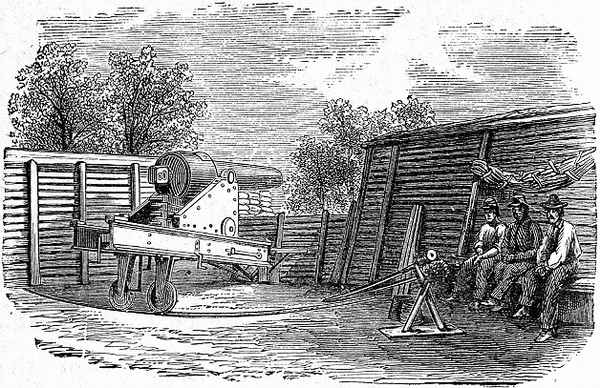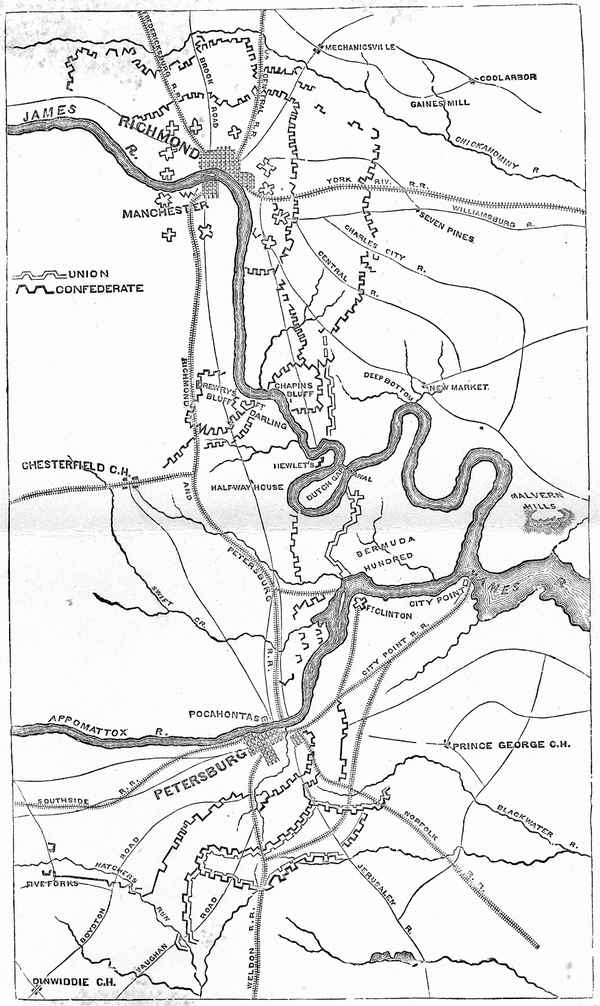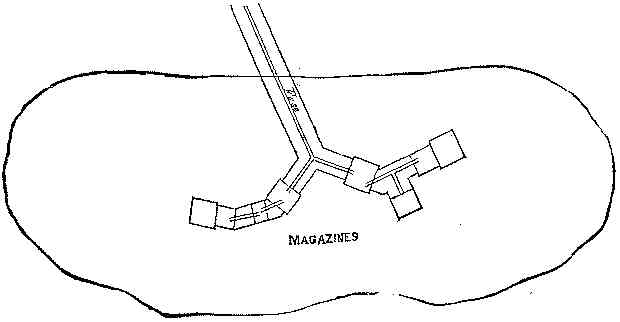
Perry's Saints
or
The Fighting Parson's Regiment
• Title
• Author
• Preface
• Chapter I
• Chapter II
• Chapter III
• Chapter IV
• Chapter V
• Chapter VI
• Chapter VII
• Chapter VIII
• Chapter IX
• Chapter X
• Chapter XI
• Chapter XII
• Chapter XIII
• Chapter XIV
• Chapter XV
• Chapter XVI
• Chapter XVII
• Chapter XVIII
• Chapter XIX
• Chapter XX
PERRY'S SAINTS.
CHAPTER XVI.
Back to Bermuda Hundred. A running fight. Destruction of railroad. Kindness of Major Young and General Terry. Ordered to charge. A happy escape. President Lincoln and General Butler. Ordered to attack Confederate line. Hecalled. Captain Fee and others killed. Picket-lines at Petersburg. Sanitary and Christian Commissions. Mine explosion. Our losses. Major Swartwout. Effects of malaria.
[June, 1864]
OF our change of base, conducted so cautiously and secretly, the enemy did not continue long in ignorance. All day we were running against the troops, ordered from the South to anticipate us in the occupancy of Petersburg. Firing was going on continually, and the only effective service that we rendered was the destruction of the railroad. Even this was only partial, as we had neither time nor appliances, for thorough work. The section of the road upon which our battalion operated was on the side of a hill, and the men being placed near together along the track, at the word of command, seized, lifted, and tumbled down the hill, the portion spanned by the line, ties and of rails going together, leaving the road-bed clean. This was repeated, until the appearance of the enemy in large numbers warned us that we should move, and move quickly, which we did. At night the men were completely exhausted, and without food, all the stores belonging to the regiment being on the steamer with the field and staff. It was plainly my duty to see that they were supplied with rations - but there was no one to whom I could apply, except General Terry, and his headquarters were miles away. I had no conveyance, and there was no one near whom I knew. The nearest regiment was the 142d Ohio, under command of Major Young. There was no alterpative, and I was compelled to apply to him for means of transportation. Although a stranger, there was little need of explanation before his horse stood ready at his tent. General Terry responded most cheerfully to my request, and by midnight the men were enjoying the simpie food which served them for the next day of labor or suffering. Neither of these officers knew what a kindly act they did that night; but had they witnessed the distribution of stores to those famishing men, who waited patiently till midnight for my return, they would have been fully repaid for their kindness. The result of the day's operations was the destruction of quite a large section of the railroad, and the capture of some fifty or more prisoners.On the 17th, the remainder of the brigade landed at Bermuda Hundred, and the regiment encamped near the intrenchments. Towards evening were ordered out to charge the enemy's intrenchments, and for an hour lay on the side of a hill, watching the movements of the brigade whose place we were to take in case it was not successful. What we witnessed was not at all inspiriting; for, as the smoke lifted from the first heavy discharge of the Confederate artillery and musketry, we looked in vain for any sign of our troops, who seemed to have been completely annihilated. To take their place was not to be looked upon as a privilege; and when the order was received to return to camp, we were not reluctant to go. It should be said, by way of explanation, that our loss was very slight, the order to lie down having been given in season to avoid the shot and shell, which passed harmlessly over our troops. Why they did not rise and charge immediately was never explained to us.
On the 18th, we remained encamped near the intrenchments. The 18th and 6th corps were

BATTERY NEAR DUTCH GAP.
in our vicinity, while the 2d, 5th, and 9th were near Petersburg. We heard heavy firing, but could. learn nothing definite concerning the progress of our army.
On the afternoon of the 22d, a message was received from General Butler that President Lincoln was approaching our vicinity, and would shortly reach the point where we were encamped. The purpose of the message was to give time and opportunity to arrange a fitting welcome, but it was unfortunate tJ.1at nearly all the troops in our neighborhood were hundred-days men, who, having been enlisted to do duty within their respective states, had been forced into the Army of the Potomac, and pushed into the most perilous service, in violation of their contract. For this reason they were much disaffected, and one regiment, at least, had been deprived of its arms, and placed under guard, to prevent a serious outbreak. Naturally, the message of General Butler was received by them very coldly, and as the cavalcade surrounding the President appeared, there were but few straggling squads of soldiers in sight, and from these there was no sign of enthusiasm or interest. I have seen General Butler many times, and under a variety of conditions and surroundings, but never so completely disconcerted as then. As the party n.eared the point where we stood, an aid was hurriedly sent forward to command the men to cheer, and General Butler, dropping behind the President, endeavored, by frantic gestures and pantomime, to enforce the orders of his aid. But all to no purpose, The men were angry and sullen, and when the general, rising in his stirrups, shook his fist at them, the exhibition of impotent rage was greeted with shouts of derision. As the little cavalcade advanced farther along the line, an effort was made by the other troops in the vicinity to make amends to our honored and beloved President for this discourtesy; but, while the whole army was intensely loyal, and devotedly attached#to him, he was unfortunate in having, as his chief escort through our lines, a general who had, at least temporarily, lost the confidence and respect of the command.
On the 23d, the regiment was ordered to join that portion of the army in front of Petersburg. Nothing unusual occurred until the 30th, when we were ordered to prepare for a charge on the Confederate works. Instead of remaining where we were, protected by our intrenchments, until the charge was ordered, we were moved over our earthworks, where we were kept for some time, exposed to a murderous

DEFENCES OF RICHMOND AND PETERSBURG.
fire, by which Captain Fee, a brave and excellent officer, and many others, were killed or severely wounded. After nearly a half-hour of this exposure, we were recalled, and the attack was given up, as well it might be after our intention was so fairly made known to the enemy.
At this time the main lines of the two armies were in such close proximity that the utmost care was necessary, especially on the part of the pickets who were posted in the little valley between, and were so near that no part of the body could be exposed for an instant without drawing the fire of the enemy. The approach to the picket-line was through intricate and carefully protected, covered ways, but, with all the precautions which ingenuity could devise, day by day our ranks were diminished by losses. Many of these occurred in the passage to and from these picket-lines, and often were due to the recklessness and carelessness of the men. Many and curious were the devices used to draw the enemy's fire, by exposing a hat, or coat, or other object, while, from ingeniously constructed lookouts, our men watched for the heads which were sure to pop up from behind
[July, 1864.]
their intrenchments in the eagerness for a shot. This brutal warfare was kept up during our whole stay in front of Petersburg, except when a short truce brought the picket-lines together, when the utmost freedom of intercourse prevailed. At such times papers were exchanged, the situation discussed, and the best of friends seemed engaged in mutual congratulations. In a few moments, the old state of things was resumed, with all its cruelties.At this time more than ever before, we realized the magnitude of the works performed by the. Sanitary and Christian Commissions. As an illustration, I find it recorded in my journal that at this time our whole army was supplied with vegetables by the Sanitary Commission; while the agents of both societies were to be found in camp and hospital, ministering to the sick, wounded, and needy, with a generous impartiality, which made no distinctions, and shrunk neither from danger by bullet or contaminating disease. It is not my province to enter into a history of these societies; but I should be ungrateful did I not make fitting acknowledgment of the good work per- formed by those devoted Christian men and women. Not only were the officers and soldiers largely benefited as individuals, but the army, as a whole, was sustained and strengthened by the knowledge that through these two societies, and others of similar Character, the whole people were manifesting

OUTLINE OF THE CRATER AND MAGAZINES.
their readiness to bear their share of burden and sacrifice. The office which they performed, in establishing and sustaining a higher moral standard in the army, and the increased efficiency which resulted from it, cannot be overestimated.
During the most of July, we occupied the front or rear lines before Petersburg, under fire the most of the time, the shot and shell reaching us even in the most protected spots. The men were picked off by sharpshooters whenever within range, and there was no respite from duty, although we participated in no regular engagement until the 30th. At sunset on the 29th, the regiment took up its line of march to the left and rear, to be ready to join in the attack which was to be made immediately after the explosioD, of the mine in front of the 9th corps. The explosion took place between four and five o'clock on the morning of the 30th, and the attack was made; but, owing to want of preparation, or some lack in the arrangement, the favorable moment was allowed to pass, and the charge was irregular and ineffective. After advancing to the ground which had been occupied by the fort, a halt was made, intrenchments thrown up, and two guns mounted. This gave an opportunity for the enemy to rally, and when at last the charge was made upon Cemetery Hill, which was immediately in front, and some four hundred yards distant, the concentrated fire from the front, and from either flank, ploughed. through our lines, creating disorder and confusion. The loss was dreadful, regiments and brigades being almost completely annihilated; a second attempt only added to a disaster which was one of the most serious that our army had suffered for months. Our division had been joined to the 18th corps, which made a demonstration on the right, but without avail. Our losses were severe. Among the killed was Major Swartwout, one of the oldest and best of all the officers who had been connected with the regiment. Noone among us possessed to a larger extent the real soldierly instincts, and no one was more generally beloved. His genial good-nature, his ready humor, and exuberant spirits, made him welcome in every circle. Lieutenant O'Brien was also killed, and our loss otherwise, in non-commissioned officers and privates, was severe. The scheme, which originated with Lieutenant-Colonel Pleasants, of the 48th Pennsylvania regiment, was well conceived and perfected by him; but the attack which followed the explosion was managed badly.
July 31, the regiment was ordered to Bermuda Hundred, where we remained until